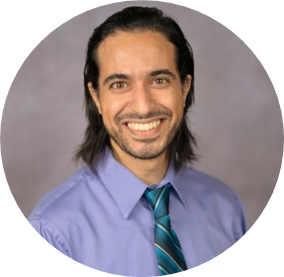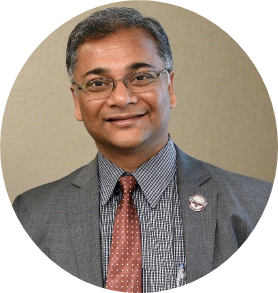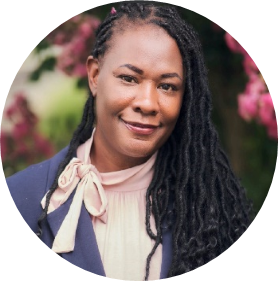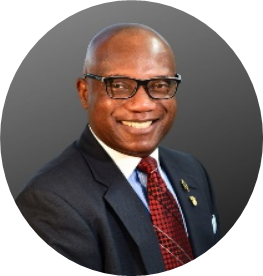OVERVIEW
The Provost Faculty Fellows program is designed to provide leadership and administrative experience for faculty members. Fellows will assume responsibility for a focused project that supports a strategic priority of the University and become familiar with campus-wide initiatives, strategic planning, and shared governance. They will also have opportunities to participate in leadership meetings and engage with colleagues in the Office of the Provost and other academic and administrative units.
Upon completion of the program, the Fellows will be able to:
- A. Describe various leadership theories.
- B. Identify their leadership style and its potential impact on a team.
- C. Discuss the different roles and responsibilities of an academic supervisor.
- D. Describe the key components of effective team dynamics.
- E. Distinguish the various techniques used to resolve conflicts.
- F. Apply the principles in giving and receiving constructive feedback.
- G. Collaborate with campus stakeholders to develop, lead, and implement a University-wide strategic initiative.
PROGRAM STRUCTURE
Stipend and Professional Development
The program will occur during the fall and spring semesters. There will be six to ten Fellows who each will receive a stipend and $2,500 in professional development funds. The Office of the Provost will also provide the department with support for a course release for the fall and spring semesters.
Leadership Component
The leadership component of the Provost Faculty Fellows Pilot program aims to foster a culture of leadership excellence, collaboration, and continuous improvement among faculty members. It will also empower them to lead with vision, integrity, and impact in support of the University’s mission and strategic priorities.
Key features of the leadership component include:
- A. Leadership Development Workshops – The Fellows will participate in a series of interactive workshops focused on personal leadership strengths, leadership theory and styles, roles and responsibilities of supervisors, team dynamics, conflict resolution, and giving and receiving feedback. The sessions are led by experienced leaders from academia, industry, and the community.
- B. Mentorship and Coaching – The Academic Deans and external administrators will serve as mentors and coaches during the program. The Provost will provide guidance, support, and feedback to the Fellows as they complete their projects and navigate the University community.
- C. Leadership Projects – The Fellows will assume leadership of projects or initiatives that address specific priorities or opportunities within the University. These projects will focus on student success, enrollment, assessment, research, and faculty affairs initiatives.
- D. Collaborative Leadership Opportunities – The Faculty Fellows will collaborate with faculty from various disciplines and staff across all divisions to complete their projects. They will also participate in various meetings to include, but not limited to, Extended Cabinet, Dean’s Council, and Chair’s Council.
PROJECTS
Project I
A. UMES Strategic Plan Priority and Goal
UMES Strategic Priority I – Academic Excellence and Innovation
Goal 1.3 – Recruit, retain, and develop exceptional faculty and staff, and nurture a dynamic environment in which they thrive – Teaching Excellence
B. Title
Fostering an Environment of Teaching Excellence and Innovation
C. Description
This project will allow the Fellow(s) to work closely with the Director of the Center for Teaching Excellence and the Vice Provost for Faculty Affairs to review high-impact practices, assess the climate of faculty burnout, and ensure the onboarding process and faculty evaluation tools are dynamic and supportive. Ultimately, the Fellow(s) will be responsible for developing a seamless onboarding process and a faculty well-being plan. They will also revise the student evaluation of faculty tool and contribute to the planning and development of teaching resources and the Innovations in Teaching and Learning Conference. The Fellow(s) will collaborate with several campus stakeholders to include Human Resources, Center for Instructional Technology and Online Learning, Information Technology, Counseling Center, and Administrative Computing.
Project II
A. UMES Strategic Plan Priority and Goal
UMES Strategic Priority I – Academic Excellence and Innovation
Goal 1.1 – Attract, retain, and graduate more aspiring students at the undergraduate and graduate levels – Student Success Strategic Plan
B. Title
Assessment of Student Success Initiatives – Summer Bridge program, FOCUS program, and Predictors of on-time Graduation
C. Description
This project will focus on the assessment and evaluation of several student success initiatives. They include the Summer Bridge program, FOCUS program, and one additional analysis on the predictors of on-time graduation. The Summer Bridge program examines math and English skills of the prospective students and the FOCUS program provides support for students who are on academic probation. The Fellow(s) will have an opportunity to collaborate with the Office of Decision Science and Visualization, Director of Assessment, Administrative Computing, Registrar’s Office, and the faculty as they evaluate data and make recommendations to enhance student success.
Project III
A. UMES Strategic Plan Priority and Goal
UMES Strategic Priority IV – Research and Community Engagement
Goal 4.1 – Develop and strengthen infrastructure to develop research
B. Title
Journey to Research Excellence
C. Description
The University of Maryland Eastern Shore aspires to become an R1 university. To that end, the university proposes to establish a cadre of Research Fellows to provide leadership and support to faculty. Research Fellows will be selected from each School and work closely with the VP for Research and staff to achieve the following goals:
- Develop a culture of intellectual inquiry and research in their academic school;
- Identify barriers/challenges to enhancing research productivity and work collectively to find solutions;
- Coordinate works-in-progress workshops and research seminars;
- Mentor early career scholars and other academic personnel in research;
- Identify grant opportunities, disseminate them within the school, organize workshops/clinics to support grant writing and expand the number of applications;
- Coordinate the collection and reporting of research-activity data to the Office of Research;
- Advocate for the disciplines within the school and work collectively to secure resources for each discipline area to enhance research activity and reputation;
- Support the establishment of core research facilities and broader access to university research infrastructure;
- Grow the pipeline of research students and overall participation by the UMES community in research activities.
- Champion the push to R1 to serve the university’s mission and implement the research strategic plan.
Project IV
A. UMES Strategic Plan Priority and Goal
UMES Strategic Priority II – Access, Affordability, and Achievement
Goal 2.1 – Increase enrollment – Stop-out Students
B. Title
Enhance Enrollment of Stop-out Students
C. Description
This project will focus on the re-enrollment of Stop-out students. The Fellows will collaborate with the Registrar’s Office, Student Accounts, Financial Aid, the Student Success Coordinator, and the Program Directors to review the current process for re-enrolling students and make recommendations to revise as needed. The review will examine outreach and follow up with students (email, text, call, website, etc.), students’ readiness to re-enroll, barriers to re-enroll, expectations for all departments involved, and student support services. The Fellows will develop a process map and guidance documents where appropriate. They will also consider how to track the students and assess the effectiveness of this strategic initiative.
Project V
A. UMES Strategic Plan Priority and Goal
UMES Strategic Priority I – Academic Excellence and Innovation
Goal 1.1 – Attract, retain, and graduate more aspiring students at the undergraduate and graduate levels – Student Success Strategic Plan
B. Title
UMES Student Success Strategic Plan Priority II – Build Community and Sense of Belonging
C. Description
The Fellows will collaborate with University stakeholders to develop programming for first-year students that will build community amongst the cohort and strengthen sense of belonging with the institution. It will include a revision of the FYE course with faculty input, career and professional development series (resume, internship, job shadow, career fair, etiquette), research opportunities with faculty, social activities with faculty and staff, touchpoints with assigned mentors and RAs, social media page and website for the cohort, workshops (study skills, coping, well-being, note-taking, leadership), engagement with student organizations, small acknowledgements throughout the year, and an end of year celebration.
The Fellows will also develop programming for second-year students that will build community amongst the cohort and strengthen sense of belonging with the institution. It will include a needs assessment of the sophomore class, a sophomore kick-off event, career and professional development series (resume, internship, job shadow, career fair, etiquette), research opportunities with the faculty, social activities with faculty and staff, touchpoints with assigned mentors and RAs, workshops (study skills, coping, well-being, note-taking, funding options, degree audits, leadership), engagement with student organizations, intentional sophomore residence hall training, small acknowledgements throughout the year, and an end of year celebration.
Project VI
A. UMES Strategic Plan Priority and Goal
UMES Strategic Priority I – Academic Excellence and Innovation
Goal 1.1 – Attract, retain, and graduate more aspiring students at the undergraduate and graduate levels – Student Success Strategic Plan
B. Title
UMES Student Success Strategic Plan Priority I – Summer Bridge Program
C. Description
The overall goal of this project is to review the learning activities and non-academic activities of the program. This includes the English and Math courses and the socialization events. The Fellow(s) will collaborate with campus stakeholders to identify key expectations for the Summer Bridge participants. An assessment tool will be developed to determine the effectiveness of the program.
ACTIVITIES BEYOND THE PROJECT
The Fellow will have an opportunity to participate in the following during the program:
- Extended Cabinet Meetings
- Provost Meetings with the Faculty
- MSCHE Meetings
- Strategic Planning Committee Meetings (applicable sub-committees)
- Dean’s Council Meetings
- Chair’s Council Meetings
- Academic Council Meetings
- Faculty Assembly
- Senate Meetings
- USM Meeting(s) – Academic Affairs Advisory Council (AAAC)
- Eastern Shore Delegation Meetings
EXPECTATIONS
The expectations are designed to ensure that faculty participants make meaningful contributions to the Provost Faculty Fellows program, enhance their professional growth, and support the mission of the University of Maryland Eastern Shore.
- Active Engagement – Fellows are expected to actively engage in all program activities, including meetings, workshops, and special events.
- Professional Development – Commit to ongoing professional development by participating in training sessions, seminars, and other educational opportunities provided by the program.
- Collaboration – Work collaboratively with fellow participants, faculty, and administration to promote a collegial and supportive environment.
- Leadership – Demonstrate and develop leadership skills by taking initiative in projects and contributing to the strategic goals of the University.
- Project Development – Develop and implement a project that addresses a critical need or opportunity within the University, providing periodic updates and a final presentation to the campus.
- Communication – Maintain open and effective communication with all campus stakeholders, fellow participants, and University leadership.
- Time Management – Effectively manage time to balance fellowship responsibilities with regular faculty duties, ensuring all obligations are met. Refrain from assuming any course overloads.
- Evaluation – Participate in assessment and evaluation of the program, providing constructive feedback to help improve future iterations. Also, participate in self-assessment activities.
- Representation – Represent the Provost Faculty Fellows program and the University positively in all professional settings.
- Ethics and Integrity – Uphold the highest standards of ethics and integrity in all activities associated with the fellowship and broader University responsibilities.
ELIGIBILITY
Fellowships are open to all full-time faculty members with the exception of the deans. Candidates must have demonstrated interest and/or experience in one of the project areas and have excellent organizational, interpersonal and communication skills.
APPLICATION PROCESS
To be considered for participation in the program, applicants should submit the following to Mrs. Crystal Drayton (cmdrayton@umes.edu):
- Contact Information – name, title, faculty rank, department, email, and phone
- Letter of Interest – must include a discussion of 1) career goals, 2) interest in academic leadership, 3) interest in one of the projects and 4) any prior experience in one of the project areas
- A copy of current Curriculum Vitae
- Recommendation form signed by the Dean and Department Chair
The application period is closed for the AY 2024-25. It will reopen in the spring for academic year 2025-26.
FELLOWS – INAUGURAL COHORT

Dr. Lily Chi-Fang Tsai
Criminal Justice
ltsai@umes.edu
Project: Teaching Excellence and Innovation
Dean Mentor: Dr. LaKeisha Harris
Dr. Lily Chi-Fang Tsai is a Professor in the Department of Criminal Justice and the Administrative Director of the Futures Institute at the University of Maryland Eastern Shore. She has a multidisciplinary educational background, holding a Ph.D. in Criminal Justice, a Master of Science in Geographic Information System Management, a Master of Arts in Criminology, and a bachelor’s degree in Law, with education completed in both the United States and Taiwan.
As a researcher, Dr. Tsai’s work is interdisciplinary, employing qualitative, quantitative, or mixed methods. Her research has been published in academic journals, covering topics such as public perceptions of police, and job stress and coping mechanisms among law enforcement officers. She has also conducted empirical legal research on corporate crime, white-collar offenses, and medical care in the U.S. prison system and civil liability actions. As a grant recipient from the Maryland Governor’s Office, Dr. Tsai is currently exploring the applications of facial recognition technology and AI tools in the criminal justice system, further demonstrating her commitment to advancing knowledge and practice in this vital field.

Dr. Bridgett Clinton-Scott
Human Ecology
Graduate Program Director
beclinton@umes.edu
Project: Stop-out Students
Dean Mentor: Dr. LaKeisha Harris
Dr. Bridgett Clinton-Scott is an Associate Professor and Graduate Program Director in the Department of Human Ecology at the University of Maryland Eastern Shore (UMES) where she has taught since 2005. Dr. Clinton-Scott earned her Doctor of Management from University of Maryland Global Campus (formerly known as University of Maryland University College). In addition, she has a M.S. in Merchandising Management from Michigan State University and a Graduate Certificate in Marketing from Southern New Hampshire University she completed in 2022. Dr. Clinton-Scott teaches courses in the areas of visual merchandising, merchandise buying and planning, advertising and promotion, computer-aided design for fashion merchandising and design, product development, fashion illustration, supervisory management, international retailing and fashion sustainability. She also serves as academic adviser for fashion students in the department. Dr. Clinton-Scott has conducted research in the areas of organizational management, knowledge transfer, and consumer behavior. She has authored several publications and juried design pieces.

Dr. Omar Attarabeen
Pharmacy Practice and Administration
ofattarabeen@umes.edu
Project: Assessment of Student Success Initiatives
Dean Mentor: Dr. Derrek Dunn
Dr. Omar F. Attarabeen is an Associate Professor of Pharmacy Administration at the Department of Pharmacy Practice & Administration. Dr. Attarabeen’s research interest lies in the areas of programmatic assessment, faculty; staff; and student wellness, health behavior, and minorities’ utilization of healthcare services. Dr. Attarabeen’s professional service is focused on assessment of student success and curricular effectiveness. Finally, Dr. Attarabeen is a registered pharmacist in West Virginia as well as in Maryland.

Dr. Kausiksankar Das
Natural Sciences
Director, Center for Student Excellence
kdas@umes.edu
Project: Journey to Research Excellence
Dean Mentor: Dr. Sean Vasaitis
Dr. Kausik S. Das, a Professor of Physics, is a distinguished physicist at the Department of Natural Sciences and the Director of the Center for Student Excellence at the School of Agricultural and Natural Sciences. His research is dedicated to developing innovative, cost-effective solutions to some of the world’s grand challenges. Dr. Das’s work spans a wide range of fields, including biomimicry, developing advanced materials, nanotechnology, low-temperature plasma, microgravity research, climate change, PFAS and microplastic detection, remediation and destruction, as well as fluid dynamics — aiming to create practical and impactful applications and solutions.
A Fellow of the American Physical Society and the Kavli Institute for Theoretical Physics, Dr. Das is also a recipient of the USM Board of Regents Faculty Award for scholarship, research, or creative activity, reflecting his significant contributions to the field. He has been appointed by the Governor of Maryland to the Governor’s Commission on South Asian American Affairs and he was also invited to the White House Summit among national leaders in fusion energy to help shape the plan and policy for achieving pilot-ready fusion technology in the next decade.

Dr. Kawanda Williams
Pharmacy Practice and Administration
Assistant Dean for Experiential Education
kmwilliams3@umes.edu
Project: Student Success – Build Community and Sense of Belonging
Dean Mentor: Mr. Chris Harrington
Dr. Kawanda McCarthy Williams is an experienced pharmacy educator and administrator currently serving as the Assistant Dean for Experiential Education and Assistant Professor of Pharmacy Practice at the University of Maryland Eastern Shore (UMES). With a strong background in pharmacy practice, Dr. Williams has held various leadership roles, including Director for Experiential Education at the American University of Health Science and Director of Advanced Pharmacy Practice Experience at the University of Texas at Tyler.
Dr. Williams has a proven track record in developing high-quality experiential education programs, recruiting and retaining preceptors, and fostering diversity, equity, and inclusion within educational settings. She is deeply committed to enhancing student experiences and outcomes through innovative teaching and inclusive practices.
Dr. Williams leverages her extensive background as an educator and community advocate to build partnerships that enhance advanced student rotation opportunities and develop new practice sites across the United States and internationally. Under her leadership in Experiential Education, UMES students have participated in global opportunities in Spain, Ghana, the United Kingdom, and South Africa.

Dr. George Ojie-Ahamiojie
Hospitality Tourism and Management
gojieahamiojie@umes.edu
Project: Stop-out Students
Dean Mentor: Dr. Moses Kairo
Dr. George Ojie-Ahamiojie is an Associate Professor of Hospitality and Tourism Management program. He is the author of the books “Essential Leadership Skills for Hospitality Supervisors: An Experiential Approach,” and “Upward Mobility: Interviewing and Career Management.”
In 2019, he was recognized and given the “Worcester County of Maryland Drug and Alcohol Abuse Award for Outstanding Achievement in Prevention,” by the Worcester County Health Department. Governor Larry Hogan and Senator Chris Van Hollins of Maryland also presented him with citations for his work in Drug and Alcohol Abuse Prevention.
He was awarded The UMES Second Annual Student Choice for Teaching Excellence Badge of Distinction for 2021-2022. He was awarded the “Partners in Excellence,” the highest award given by the Walt Disney Company for excellent performance, guest satisfaction, cast excellence, and business results. Also awarded “President Bill Tiefel Award” by Marriott International for quality service and guest service, and satisfaction.

Dr. Tamarah Thompson
Physician Assistant
Didactic Education Director
ttthompson@umes.edu
Project: Teaching Excellence and Innovation
Dean Mentor: Mr. Chris Harrington
Dr. Tamarah Thompson is a native of Baltimore, Maryland who has dedicated her career to serving underprivileged and underserved individuals and communities since receiving her Bachelor of Science in Community Health from Morgan State University in 2001. Since that time, she has served as a Community Health Educator for Baltimore County Health Department in addition to working as a grant writer, reviewer, and curriculum developer for the Centers for Disease Control and Prevention (CDC) HIV education initiatives targeting high-risk sexually active African American women and adolescents.
She also has served as the Assistant Program Director for Health, Education, Advocacy, and Life (H.E.A.L, Inc.), spearheading and managing several community grant projects which included an adult literacy education program, a fatherhood program, and a residential housing program in an underprivileged Baltimore neighborhood while pursuing her first Masters in Community Health. After receiving her degree, Tamarah transitioned to healthcare administration serving as the Assistant Director/Quality Improvement Manager/Medical Coordinator at a local Federally Qualified Healthcare Center for five years where she oversaw day-to-day operations for Hidden Garden, a Ryan White funded program that provided medical, case management, housing, substance abuse, mental health, nutrition, and outreach services to individuals living with HIV/AIDS.

Dr. Gabriela Vlahovici-Jones
English and Modern Languages
Acting Composition Coordinator
gvjones@umes.edu
Project: Student Success – Summer Bridge Program
Dean Mentor: Dr. Sean Vasaitis
Dr. Gabriela Vlahovici-Jones serves as Acting Composition Coordinator in the Department of English and Modern Languages. She earned her Ph.D. in English from the University of Maryland, College Park, where she specialized in language, writing, and rhetoric. Her research focuses on classical rhetoric, the visual rhetoric of ancient coin images, and women’s rhetorical theories and practices. Her publications explore the ethos of women orators, visual representations of women on ancient coins, and rhetorical education. At the University of Maryland Eastern Shore, Dr. Vlahovici-Jones has taught courses in freshman and advanced composition, technical writing, linguistics, ancient literature of the Mediterranean world, and public speaking. She served as President of the UMES Chapter 312 of the Honor Society of Phi Kappa Phi and participated in grant projects to curate and promote the university’s historical archives.


